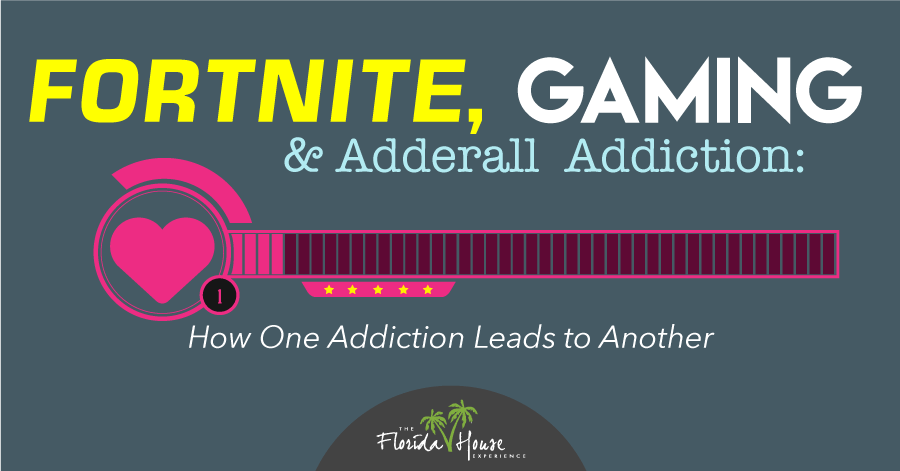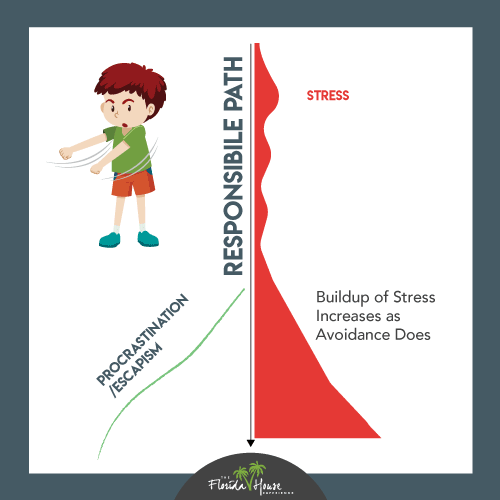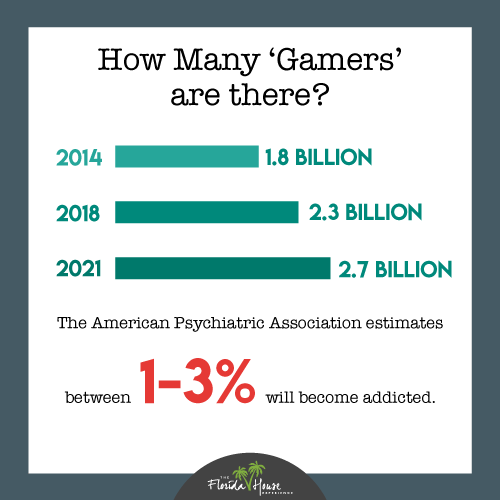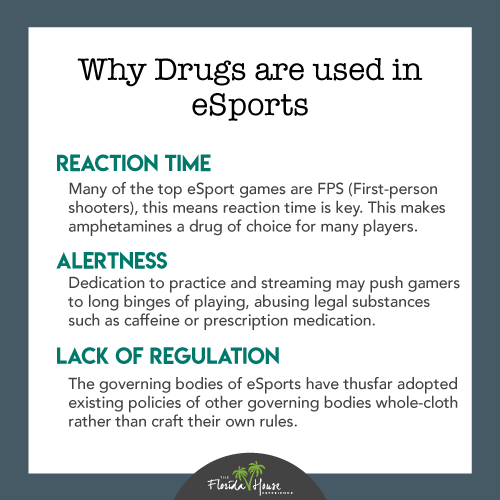
Video games have long been a part of day-to-day life. Many men and women can remember playing them as a child, spending a few hours a week with a favorite console controller in hand. Over the last few decades, the number of games, the ease of accessing games just about anywhere, and the inexpensive (and even free) options available have made it even more likely that people in a household will spend a few hours in front of a computer or TV screen. Addiction disorder is now a recognized condition by the World Health Organization. Of course, not everyone who engages in playing video games is on the path we lay our below, in fact, the best statistics available indicate very few people meet the standards for ‘video game addiction’, but it is something to be aware of.
How a Video Game Can Take Over
 Consider a simple scenario. An individual feels the need to escape from the stresses of his or her life for a few minutes by turning on a video game. This game — playable on a home laptop, smartphone and even a work computer — is easy to access and free to use. Fortnite is a good example, a game accessible on just about every device that can play a game. Soon, the feeling of being stress-free becomes enjoyable. The amount of time spent on the game increases. The challenges and allure of the game — and the feeling of success in accomplishing tasks within the game — keep the individual coming back. The more time dedicated to the game, the more work piles up in the real world, and with it the desire to escape from it.
Consider a simple scenario. An individual feels the need to escape from the stresses of his or her life for a few minutes by turning on a video game. This game — playable on a home laptop, smartphone and even a work computer — is easy to access and free to use. Fortnite is a good example, a game accessible on just about every device that can play a game. Soon, the feeling of being stress-free becomes enjoyable. The amount of time spent on the game increases. The challenges and allure of the game — and the feeling of success in accomplishing tasks within the game — keep the individual coming back. The more time dedicated to the game, the more work piles up in the real world, and with it the desire to escape from it.
Soon, the need to game is so great that day-to-day tasks and responsibilities begin to become less important. The individual finds himself unable to stop thinking about and playing the game for any length of time. Video games can also take on a competitive aspect that demand focus and peak performance. Some even turn to drugs, such as Adderall, to help give them the focus and energy they need to stay tuned in to the game and to balance responsivities. This is the reality for an increasing number of people.
What Is Video Game Addiction?
Frequently called video game addiction or a gaming disorder, the condition involves individuals who engage in playing video games even when it has a negative impact on his or her life. According to WHO, gaming disorder occurs when a person has impaired control over gaming, especially when gaming takes priority over other daily activities, responsibilities and interests. An individual can be diagnosed with this condition, according to WHO guidelines, if he or she has had a negative impact in areas such as occupation, personal relationships, social relationships or other important areas over the last 12 months.
Why Do Video Game Addictions Occur?
 By 2021, there will be 2.7 billion gamers around the globe, according to Statista. In 2014, there were just 1.8 billion, and in 2018, there were 2.3 billion. Games such as World of Warcraft continue to build onto their long-term role-playing games to keep fans engaged. Other games, such as Fortnite, require very little investment up front to get started, encouraging even young children to play. Due to the viral nature of the internet, there can be a peer pressure to try out a the phenomenon status some games achieve. You likely remember the few weeks when PokemonGo first launched. Research published by the American Psychiatric Association states that between 1 and 3 percent of individuvals considered ‘gamers’ will become addicted to it.
By 2021, there will be 2.7 billion gamers around the globe, according to Statista. In 2014, there were just 1.8 billion, and in 2018, there were 2.3 billion. Games such as World of Warcraft continue to build onto their long-term role-playing games to keep fans engaged. Other games, such as Fortnite, require very little investment up front to get started, encouraging even young children to play. Due to the viral nature of the internet, there can be a peer pressure to try out a the phenomenon status some games achieve. You likely remember the few weeks when PokemonGo first launched. Research published by the American Psychiatric Association states that between 1 and 3 percent of individuvals considered ‘gamers’ will become addicted to it.
There are a variety of reasons video game disorders form. Most commonly, individuals play these games to escape from reality. They are unable or unwilling to manage the day-to-day tasks they are responsible for and, as such, are faced with the desire to game. In one study from 2009, 41 percent of individuals who played online versions of video games stated they did so to escape the real world. That study found about 7 percent of those in the study were dependent on video games, much like an individual with a substance abuse disorder is addicted to alcohol or drugs.
There may be a genetic component that makes some people have a predisposition to develop an addiction to video games, though research remains limited on this. In other cases, individuals with other addiction tendencies, such as alcoholism or drug use, may be more likely to use gaming as a substitute. In the vast majority of cases, it is not fully understood why some develop an addiction and others do not.
How Gaming and Drug Addiction Mix
 Gaming and drug addiction could have a significant link. In some situations, drugs enhance gaming performance, much like the use of a steroid by an athlete. In some professional gaming arenas, such as in eSports, where individuals compete to earn cash prizes, the use of performance-enhancing drugs like Adderall is sometimes common and rarely regulated. Furthermore, ‘streaming’ is extremely common in the gaming space as additional revenue incomes for people who center their lives around games. Beginning with ‘Let’s Play’ videos in the early days of YouTube, there are now thousands of people who stream their live video feeds of gameplay on to sites such as Twitch for their audience to watch. These gamers are constantly on camera and are expected to, in some ways, perform for their audience and always be on the top of their game. It is no wonder the pressure of this life has driven some to become reliant on performance-enhancing drugs.
Gaming and drug addiction could have a significant link. In some situations, drugs enhance gaming performance, much like the use of a steroid by an athlete. In some professional gaming arenas, such as in eSports, where individuals compete to earn cash prizes, the use of performance-enhancing drugs like Adderall is sometimes common and rarely regulated. Furthermore, ‘streaming’ is extremely common in the gaming space as additional revenue incomes for people who center their lives around games. Beginning with ‘Let’s Play’ videos in the early days of YouTube, there are now thousands of people who stream their live video feeds of gameplay on to sites such as Twitch for their audience to watch. These gamers are constantly on camera and are expected to, in some ways, perform for their audience and always be on the top of their game. It is no wonder the pressure of this life has driven some to become reliant on performance-enhancing drugs.
Drugs like this can offer gamers a few key benefits. The drug is commonly prescribed to individuals suffering from conditions such as Attention Deficit Hyperactivity Disorder. In those individuals, the drug works to counteract the inability to focus, giving these individuals the ability to remain calm and pay attention.
In some gaming scenarios, Adderall works in the same way. However, in people who do not have this type of disorder, the drug has the opposite effect. In these individuals, Adderall can help to increase attention and provide speed-like effects. It helps people stay awake and focused longer. It can create a high level of energy, allowing for long hours of playing video games. This means that using a drug like this can help gamers to spend more time playing, potentially play at a higher skill level because they have more energy and play consistently.
Though the science behind how Adderall works like this is limited, some researchers believe a placebo-like effect takes place. In all cases, this type of drug may give people better cognitive control.
What Is the Negative Impact of Having a Gaming Disorder?
Individuals who suffer from a gaming disorder may be unable to spend enough time focused on their responsibilities and relationships. This can lead to destructive behavior and poor health overall. There is also the possibility that individuals will use other substances to gain the same high they feel when gaming.
As with many drugs, to feed the body’s needs, individuals must game more frequently. They may need to engage in more competition. Some may spend a significant amount of money within and on these games to enhance their abilities or achieve more advanced levels.
Seeking Addiction Treatment for Gaming Disorder
Individuals who game frequently, or think about gaming on a consistent basis, may benefit from addiction treatment. At FHE Health, many individuals have suffered from substance abuse, alcoholism and other disorders that include gaming disorder as a secondary or co-occurring condition. If this sounds like you, there is help available.
Through treatment, it may be possible to improve the quality of life of the individual and help restore balance in their day-to-day lives. For families, it can help to encourage individuals to reduce, or if need be, eliminate the amount of gaming they do, restoring health. Contact FHE Health to learn more about our treatment options.






